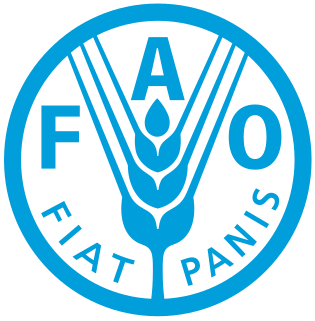Related Research Articles

The Food and Agriculture Organization of the United Nations (FAO) is a specialized agency of the United Nations that leads international efforts to defeat hunger and improve nutrition and food security. Its Latin motto, fiat panis, translates to "let there be bread". It was founded on 16 October 1945.

Globalization, or globalisation, is the process of interaction and integration among people, companies, and governments worldwide. Globalization has accelerated since the 18th century due to advances in transportation and communications technology. This increase in global interactions has caused a growth in international trade and the exchange of ideas, beliefs, and culture. Globalization is primarily an economic process of interaction and integration that is associated with social and cultural aspects. However, disputes and international diplomacy are also large parts of the history of globalization, and of modern globalization.

In general, a rural area or a countryside is a geographic area that is located outside towns and cities. Typical rural areas have a low population density and small settlements. Agricultural areas and areas with forestry typically are described as rural. Different countries have varying definitions of rural for statistical and administrative purposes.

Ladakh is a region administered by India as a union territory, which constitutes a part of the larger Kashmir region and has been the subject of dispute between India, Pakistan, and China since 1947. Ladakh is bordered by the Tibet Autonomous Region to the east, the Indian state of Himachal Pradesh to the south, both the Indian-administered union territory of Jammu and Kashmir and the Pakistan-administered Gilgit-Baltistan to the west, and the southwest corner of Xinjiang across the Karakoram Pass in the far north. It extends from the Siachen Glacier in the Karakoram range to the north to the main Great Himalayas to the south. The eastern end, consisting of the uninhabited Aksai Chin plains, is claimed by the Indian Government as part of Ladakh, and has been under Chinese control since 1962.

Food First, also known as the Institute for Food and Development Policy, is a nonprofit organization based in Oakland, California, USA. Founded in 1975 by Frances Moore Lappé and Joseph Collins, it describes itself as a "people's think tank and education-for-action center".

Edward René David Goldsmith, widely known as Teddy Goldsmith, was an Anglo-French environmentalist, writer and philosopher.

A smallholding or smallholder is a small farm operating under a small-scale agriculture model. Definitions vary widely for what constitutes a smallholder or small-scale farm, including factors such as size, food production technique or technology, involvement of family in labor and economic impact. Smallholdings are usually farms supporting a single family with a mixture of cash crops and subsistence farming. As a country becomes more affluent, smallholdings may not be self-sufficient, but may be valued for the rural lifestyle. As the sustainable food and local food movements grow in affluent countries, some of these smallholdings are gaining increased economic viability. There are an estimated 500 million smallholder farms in developing countries of the world alone, supporting almost two billion people.

Buddhist economics is a spiritual and philosophical approach to the study of economics. It examines the psychology of the human mind and the emotions that direct economic activity, in particular concepts such as anxiety, aspirations and self-actualization principles. In the view of its proponents, Buddhist economics aims to clear the confusion about what is harmful and what is beneficial in the range of human activities involving the production and consumption of goods and services, ultimately trying to make human beings ethically mature. The ideology's stated purpose is to "find a middle way between a purely mundane society and an immobile, conventional society."

Helena Norberg-Hodge is founder and director of Local Futures, previously known as the International Society for Ecology and Culture (ISEC). Local Futures is a non-profit organization "dedicated to the revitalization of cultural and biological diversity, and the strengthening of local communities and economies worldwide."

The Ecologist is a British environmental journal, then magazine, that was published from 1970 to 2009. Founded by Edward Goldsmith, it addressed a wide range of environmental subjects and promoted an ecological systems thinking approach through its news stories, investigations and opinion articles. The Ecologist encouraged its readers to tackle global issues on a local scale. After cessation of its print edition in July 2009, The Ecologist continued as an online magazine. In mid-2012, it merged with Resurgence magazine, edited by Satish Kumar, with the first issue of the new Resurgence & Ecologist appearing in print in September 2012. The Ecologist was based in London.

Tourism is one of an economic contributor to the union territory of Ladakh in Northern India. The union territory is sandwiched between the Karakoram mountain range to the north and the Himalayas to the south and is situated at the height of 11,400 ft. Ladakh is composed of the Leh and Kargil districts. The region contains prominent Buddhist sites and has an ecotourism industry.
Postdevelopment theory holds that the whole concept and practice of development is a reflection of Western-Northern hegemony over the rest of the world. Postdevelopment thought arose in the 1980s out of criticisms voiced against development projects and development theory, which justified them.
The term food system describes the interconnected systems and processes that influence nutrition, food, health, community development, and agriculture. A food system includes all processes and infrastructure involved in feeding a population: growing, harvesting, processing, packaging, transporting, marketing, consumption, distribution, and disposal of food and food-related items. It also includes the inputs needed and outputs generated at each of these steps. Food systems fall within agri-food systems, which encompass the entire range of actors and their interlinked value-adding activities in the primary production of food and non-food agricultural products, as well as in food storage, aggregation, post-harvest handling, transportation, processing, distribution, marketing, disposal, and consumption. A food system operates within and is influenced by social, political, economic, and environmental contexts. It also requires human resources that provide labor, research and education. Food systems are either conventional or alternative according to their model of food lifespan from origin to plate.
Uneven and combined development is a concept in Marxian political economy intended to describe dynamics of human history involving the interaction of capitalist laws of motion and starting world market conditions whose national units are highly heterogeneous. The concept is used by Marxist scholars concerned with economic development. David Harvey is an advocate of the usefulness of this theory to reconstruct historical materialism on Modern terms. It is an accepted key concept in academic economic geography.

The Ladakh Ecological Development and Environmental Group (LEDeG) is an environmental NGO based in Karzoo, Leh, Ladakh Union Territory in northern India. In 1986, it received the Right Livelihood Award "for preserving the traditional culture and values of Ladakh against the onslaught of tourism and development."

Ancient Futures: Lessons from Ladakh for a Globalizing World, originally published with the subtitle Learning From Ladakh, is a book by Helena Norberg-Hodge. It was first published in 1991.

The Economics of Happiness is a 2011 documentary film directed by Helena Norberg-Hodge, Steven Gorelick, and John Page, and produced by Local Futures.
Counter-development is a strategy and world-view advocated by Helena Norberg-Hodge and the Indian organization Ladakh Ecological Development Group (LEDeG). In her book Ancient Futures, Helena Norberg-Hodge entails "traditional" ways of life employed by the people of Ladakh. A broad base of people need to adopt counter-development, to check and reverse the tide of environmental destruction, social fragmentation, and to the concentration of power and wealth in the hands of transnational corporations.

Rebecca Tarbotton was a Canadian environmental, human rights, and food activist, and the Executive Director of Rainforest Action Network.

Post-growth is stance on economic growth concerning the limits-to-growth dilemma — recognition that, on a planet of finite material resources, extractive economies and populations cannot grow infinitely. The term "post-growth" acknowledges that economic growth can generate beneficial effects up to a point, but beyond that point it is necessary to look for other indicators and techniques to increase human wellbeing.
References
- ↑ Going Local: the solution-multiplier (animation)
- ↑ Localization: Essential steps to an economics of happiness (booklet)
- ↑ The Ladakh Project
- ↑ 1986 Right Livelihood Award - Ladakh Ecological Development Group (India) Archived 2009-01-08 at the Wayback Machine
- ↑ The Economics of Happiness - The Film
- ↑ Past international conferences
- ↑ "Home". worldlocalizationday.org.